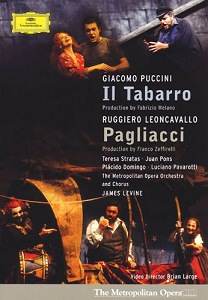Most seasoned opera lovers will know what to expect from a Met
production - extreme naturalism that's usually in period, solid
playing and singing from - generally - an all-star cast; an
all-round safe bet for your DVD opera library. It's all present and
correct here, including the most annoying traits, like clapping and
cheering every 'big' moment, whether the opportunity presents
itself or not.
At least we have to give them credit here for not picking the
ubiquitous Cav and Pag double act to open their 1994
season, opting instead to precede Pag, the more popular
crowd pleaser, with Puccini's much darker one-acter Il
Tabarro, a broodingly effective and contrasting little piece
that is done all too rarely.
Of course, they would have sold out the evenings whatever, but the
presence of the world's two most popular tenors in the star parts
will have helped. Both tenors had already sung or recorded the
respective roles, but it's interesting to note that Domingo was
saying farewell to Luigi, a part he'd done regularly since the
sixties, and Pavarotti was making his stage debut as Canio, which
seems almost unbelievable.
Both productions originated in the 1970s, being dusted down and
re-vamped here as solid, non-controversial fare for the audience.
Fabrizio Melano's Tabarro is certainly atmospheric, its gloomy
waterfront setting replete with detail, and it actually opens as
the composer intended, with the action preceding the music.
Domingo's Luigi is a typically subtle creation and he must
certainly have known the part backwards. It's a pity he's too old
for the role: Puccini specifies Luigi and Giorgetta to be in their
20s. However he's such a convincing actor and still in good voice,
so it's easy to forgive. We have to take his strangulation with a
large pinch of salt - he towers over Pons physically - but then we
take most operatic verismo moments like this with large
doses of the stuff. What's less easy to forgive is casting Stratas
as Giorgetta - she's older than Domingo - or at least allowing the
camera so many cruel close-ups. I'm a fan of Stratas (her Lulu from
the 70s is the definitive one) and she is in firm voice still, but
the whole point here is that Giorgetta is a very young wife with a
much older husband, something that's mentioned in the text a number
of times. It probably would have looked fine from a distance - even
the awful wig - but veteran Brian Large lets the camera up close
too many times for my liking. Good as they are, it's a pity that
both these artists weren't captured in their real prime in these
parts.
Juan Pons is perfectly cast as jealous husband Michele, and his
mesmerising portrayal binds the production together. The orchestra
is on fine form and Levine sees to it that Puccini's musical
landscape-painting and almost impressionistic colourings are
observed to the full. Sound quality is good but picture is, at
best, adequate.
Zeffirelli's Pagliacci is a 'bells-and-whistles' production
brimming with life and spectacle and anybody familiar with his 1984
film, now released as a double-bill with his similarly
location-shot Cav, will know what to expect. Pons and Stratas, who
double up here as Tonio and Nedda, were also in that previous
production, along with an in-form Domingo. They were all ten years
younger and it showed, but Pavarotti, it has to be said, is on good
form as Canio, even if he acts more with his voice than his body.
Zeffirelli is determined to fill the vast stage with movement and
give us thrills and spills, even to the extent of using the same
acrobats and fire-eaters as his earlier film. There, Stratas looked
perfect and even ten years on her Nedda is more convincing than her
Giorgetta, probably because she can more easily find the darker,
venomous side to the character. Pons has also matured as Tonio,
giving a more rounded character portrayal, even if his Prologue
doesn't have quite the same thrilling ring to it. Other parts are
well cast and the Met audience is quick to show its approval,
though ultimately one is left with the feeling that this is very
much Zeffirelli's Pagliacci than any of the singers. Picture
quality is better, but probably because there is more light and
colour to capture than the sepia shadows of Tabarro.
All told, pretty good value on one disc, though neither production
can match the vocal or audio quality of the best CD rivals
(Pappano, Maazel for Tabarro, Karajan, Patané or Muti
for Pagliacci). If you do like watching rather than just
listening and fancy the pairing, even with my cavils, you'll
probably enjoy this.
Tony Haywood


